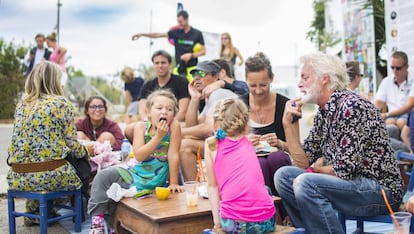Ibiza residents worry their island has been sacrificed to tourism
As visitor numbers keep rising, pressure on housing and public services making life impossible for locals
Back in the first week of July in the streets around the port of Ibiza, at La Marina, lined with shops, restaurants and nightclubs. This should be one of the busiest areas on the island, but there's not much going on. “The season has begun terribly,” said the owner of a clothes shop. “Nothing like last summer. This year, cars are not allowed through.That means most visitors are families from the cruise ships, and they walk through but do not spend a cent,” he complains.

Other local business owners echo this sentiment, adding that the traditional parades staged outside nightclubs can no longer feature scantily clad entertainers, given the growing presence of families with children. They say that “party tourism is under attack, as it was a few years ago.” Should the island look to attract more tourism? Another type of tourism, perhaps, not focused on families? The response, from anti-austerity party Podemos – which is part of the regional government in the Balearic Islands – is a resounding “no.” According to Vice President Viviana de Sans, “promoting tourism needs to be put on the back burner, at least for a year.”
Like Sans, many on Ibiza are concerned about a bubble that has not stopped growing over the last decade and one that has priced hotels and apartments beyond the reach of the traditional market of middle class tourists, who are now going elsewhere. High-end tourism has been encouraged, but many businesses are not seeing any benefit: some have tried to get on board, but that has simply meant hiking their prices.
Last year, Ibiza and Formentera received three million visitors, a 12.6% increase on 2015
Many were already warning back in 2010 that things in Ibiza were changing and that the island was running the risk of losing its identity. After many years associated with drug use, the authorities began cracking down on night clubs, banning after hours parites, for example. Almost everyone today recognizes that change was needed. Five star hotels like Ushuia, the Hard Rock, and the Gran Hotel Ibiza were built, as were luxury beach clubs like Blue Marlin and Nikki Beach. The result is that the island is now increasingly seen as the new Marbella (traditionally Spain’s most upmarket resort), with celebrities like Paris Hilton and Madonna making the trip to their privileged enclaves there in July and August.
In recent years, the growth has continued, with consecutive seasons fully booked. Last year, Ibiza and neighboring-island Formentera received three million visitors, double that of nearby Menorca and a 12.6% increase from the previous year.
Today, the island seems to be in search of a balance between what it once was and what it has turned into in recent years: a balance been continuing to attract the new global elite from Russia and the Middle East, while at the same time not abandoning its long-standing appeal to ravers in search of the best electronic music; between appealing to middle class families and the gay community, without forgetting celebrities. On an island of just 571 square kilometers, that is not an easy circle to square.
English version by Henry Hahn.
Tu suscripción se está usando en otro dispositivo
¿Quieres añadir otro usuario a tu suscripción?
Si continúas leyendo en este dispositivo, no se podrá leer en el otro.
FlechaTu suscripción se está usando en otro dispositivo y solo puedes acceder a EL PAÍS desde un dispositivo a la vez.
Si quieres compartir tu cuenta, cambia tu suscripción a la modalidad Premium, así podrás añadir otro usuario. Cada uno accederá con su propia cuenta de email, lo que os permitirá personalizar vuestra experiencia en EL PAÍS.
¿Tienes una suscripción de empresa? Accede aquí para contratar más cuentas.
En el caso de no saber quién está usando tu cuenta, te recomendamos cambiar tu contraseña aquí.
Si decides continuar compartiendo tu cuenta, este mensaje se mostrará en tu dispositivo y en el de la otra persona que está usando tu cuenta de forma indefinida, afectando a tu experiencia de lectura. Puedes consultar aquí los términos y condiciones de la suscripción digital.








































